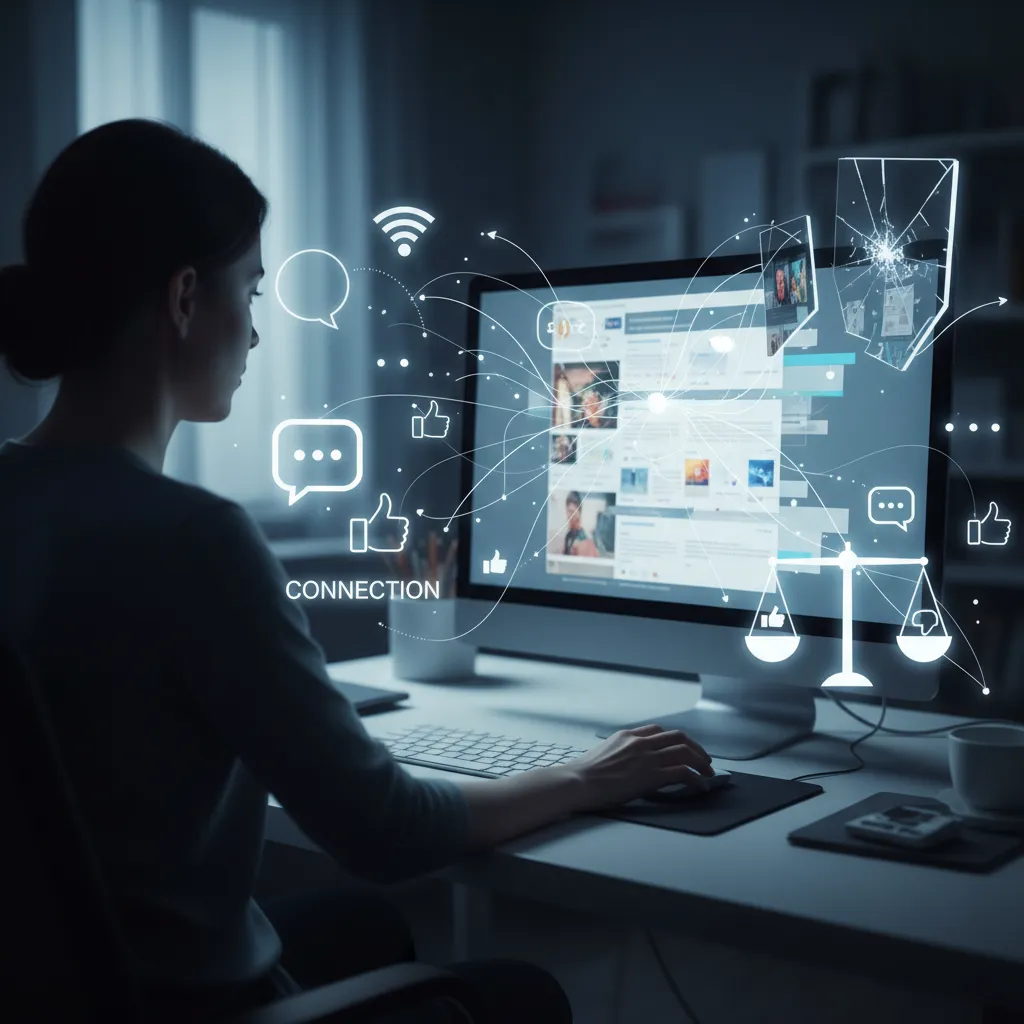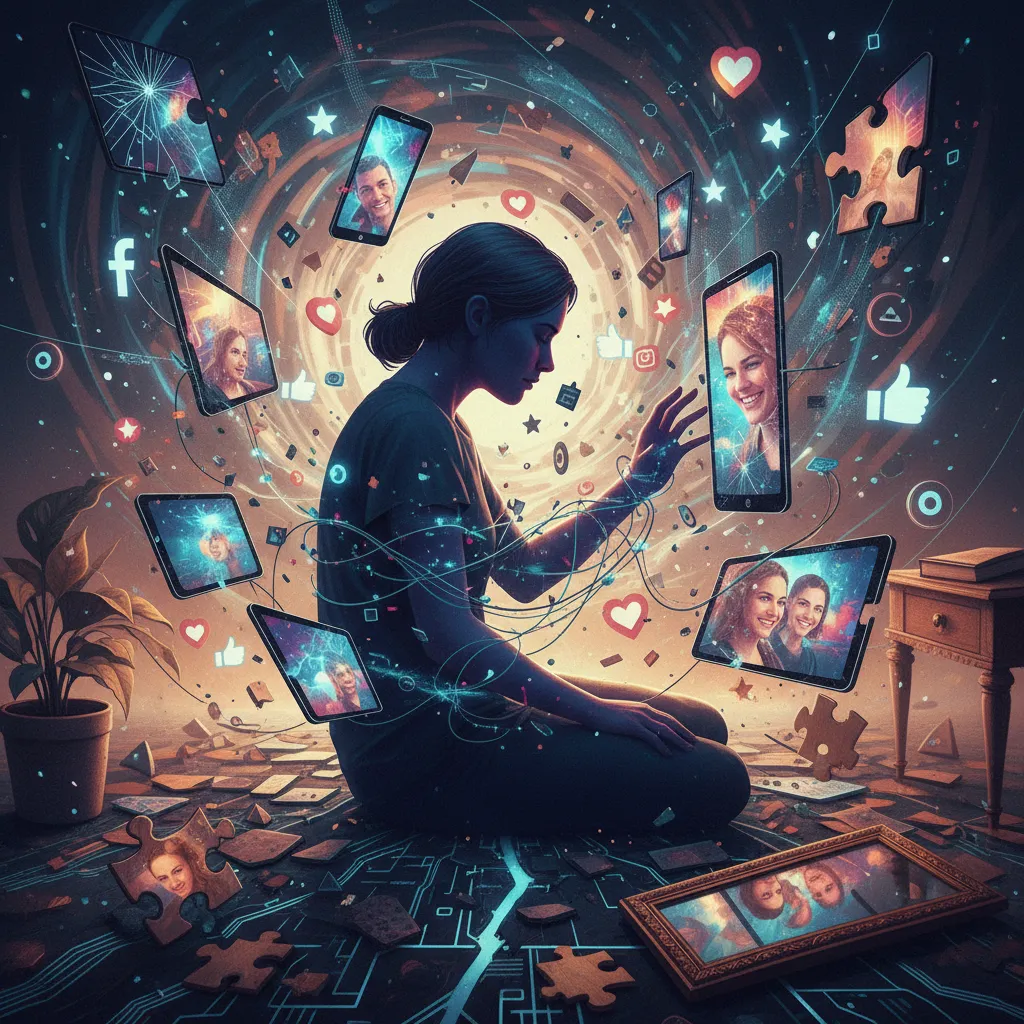Picture this: It's 1:36 a.m., and there you are, thumb aching, eyes glazed, still scrolling. (Been there? Me too.) It's odd how we can feel connected and yet oddly lonely at the same time. Social media's impact on mental health isn't just headlines—it's something you live out every day in a swirl of memes, FOMO, and perfectly-filtered vacation selfies. But what if the real story is less about good or bad, and more about how you use it—and how it uses you? Let's unravel the less obvious links between your screen time and your sanity—spoiler: it's complicated, but not hopeless.
1. Connection or Comparison? The Weird Power of the Scroll
Every day, you probably find yourself reaching for your phone, opening your favorite social media app, and scrolling through an endless stream of updates. But have you ever paused to consider how this daily habit shapes your mood? Social media is a double-edged sword: it can bring people together and offer support, but it can also quietly fuel anxiety, depression, and the urge to compare yourself to others. The difference often comes down to your intent and how you use these platforms.
Social Media and Loneliness: The Good Side of the Scroll
Feeling isolated or far from your tribe? Social media can be a lifeline. Online communities support people who might otherwise feel alone, especially if you’re dealing with social anxiety, living in a rural area, or managing a disability. When you use social media to connect authentically—joining groups that share your interests, reaching out to friends, or participating in supportive discussions—it can genuinely cut through loneliness.
Psychologist Dr. Susan Albert highlights this benefit:
"Studies have shown that it can decrease loneliness when you're using social media for its intended purpose... instead of using social media in lieu of in-person connection or validation or seeking reward."
In other words, when you use social media to find real connection, you’re tapping into its best potential. Research backs this up: people who engage with online communities for support and belonging often report lower levels of loneliness and improved mental well-being. For those who struggle to find support offline, these digital spaces can be a vital source of comfort and understanding.
When Connection Turns to Comparison
But let’s be real: who hasn’t started innocently scrolling, only to end up knee-deep in comparison mode? It’s easy to fall into the trap of measuring your life against the highlight reels of others. This is where social media comparison creeps in—and it’s a powerful force. You might catch yourself thinking everyone else is happier, more successful, or living a more exciting life. This kind of problematic social media use can quietly erode your self-esteem and trigger feelings of inadequacy.
Studies show that spending more than two hours a day on social media increases your risk for anxiety and depression. The more you scroll, the more likely you are to encounter FOMO (fear of missing out) and negative social comparison. Instead of feeling connected, you might start to feel left out or “less than.”
The Intent Matters: Connection vs. Validation
Dr. Albert’s research and clinical experience point to one crucial factor: intent. Are you using social media to connect with others, or are you seeking validation and reward? When your main goal is to collect likes, comments, or followers, the mood-boosting benefits of social media quickly fade. Instead, you may find yourself chasing approval, which can lead to a cycle of anxiety and disappointment.
- Connection-focused use: Engaging in meaningful conversations, joining supportive groups, and sharing experiences.
- Validation-seeking use: Posting for likes, comparing your life to others, and using social media as your primary source of self-worth.
The difference is subtle but powerful. Social media benefits connection when you use it to strengthen relationships and find community. But when it becomes your main source of validation, it can quietly undermine your mood and mental health.
Online Communities: A Lifeline for Many
For people who are geographically isolated, living with disabilities, or managing social anxiety, online communities support mental health in ways that offline spaces sometimes can’t. These groups offer a sense of belonging and understanding that can be hard to find elsewhere. Whether you’re joining a mental health support group, a hobby forum, or a local neighborhood page, these spaces can help you feel less alone and more connected.
In summary, the weird power of the scroll lies in how you use it. Social media can be a tool for connection or a trap for comparison. The key is to use it with intention—seeking out genuine community and support, rather than chasing validation or falling into the comparison trap.

2. The Self-Esteem Trap: When Filtering Life Gets Messy
Ever caught yourself scrolling through social media, coffee in hand, and thinking everyone else’s life looks shinier than yours? You’re not alone. Social media comparison is almost automatic. The endless stream of highlight reels—vacations, promotions, perfect selfies—can make your own day-to-day feel dull by comparison. But here’s the catch: what you see online is rarely real. Most content is carefully polished, filtered, and edited to show only the best moments. This creates a dangerous cycle for your self-esteem and mental health.
Social Media and Self-Esteem: The Comparison Game
It’s easy to forget that social media is not a true reflection of reality. People tend to post their happiest moments and best angles, leaving out the messy, ordinary, or difficult parts of life. When you compare your behind-the-scenes to someone else’s highlight reel, it’s almost impossible not to feel like you’re falling short. This is the heart of the social media and self-esteem problem.
- Filtered content sets impossible standards. The photos and stories you see are often edited, staged, or filtered. This makes it easy to believe that everyone else is happier, more successful, or more attractive than you.
- Comparison is constant. With every scroll, you’re exposed to dozens of opportunities to compare yourself to others. Over time, this repeated comparison can sap your self-esteem, even when you logically know it’s all curated.
- Validation becomes the goal. The pressure to get likes, comments, and followers can make you focus more on online approval than real-life satisfaction.
"This can create unrealistic expectations and wear down self-esteem over time." - Dr. Susan Albert
How Social Media Comparison Impacts Mental Health
When you spend significant time online—especially more than two hours a day—the risk for mental health symptoms increases. Research shows a clear link between heavy social media use and higher rates of depression, anxiety, and feelings of worthlessness. The reason? Negative social comparison.
- Depression: Seeing others’ seemingly perfect lives can make you feel like you’re not measuring up, leading to sadness and hopelessness.
- Anxiety: The fear of missing out (FOMO) and the pressure to keep up can make you feel restless or worried.
- Loneliness: Ironically, the more you compare, the more isolated you may feel, even if you’re surrounded by online “friends.”
According to recent studies, people who spend more than two hours per day on social media are significantly more likely to report symptoms of depression and anxiety. The more you compare yourself to others online, the more likely you are to feel dissatisfied with your own life. This cycle can be hard to break, especially when social media is designed to keep you engaged and coming back for more.
Why Filtered Content Is So Harmful
Filtered and polished content doesn’t just make you feel bad in the moment—it can change the way you see yourself over time. When you’re constantly exposed to unrealistic standards, your expectations for your own life shift. You might start to believe that you should always look perfect, be successful, or have an exciting social life. When reality doesn’t match up, your self-esteem takes a hit.
- Unrealistic expectations: You set goals based on what you see online, not what’s actually possible or healthy.
- Perfectionism: You become overly critical of yourself, always striving for an impossible ideal.
- Reduced well-being: Over time, your mood and sense of self-worth decline, even if you know the content is curated.
Dr. Susan Albert explains, “This can create unrealistic expectations and wear down self-esteem over time.” The more you chase the filtered version of life, the harder it becomes to appreciate your own reality.
Recognizing the Trap
If you notice that scrolling leaves you feeling flat, anxious, or less-than, you’re likely caught in the self-esteem trap. Remember: social media is designed to show you the best, not the real. Being aware of this can help you step back and protect your mental health from the negative effects of social media comparison.
 Digital Detox Reboots Your Mood (Wild Card: The Walk Challenge)" />
Digital Detox Reboots Your Mood (Wild Card: The Walk Challenge)" />3. Unplug to Replug: How a Digital Detox Reboots Your Mood (Wild Card: The Walk Challenge)
Let’s be honest: the phrase “digital detox” might sound like something reserved for wellness retreats or strict self-help regimes. But in reality, it’s much simpler—and more accessible—than that. A digital detox isn’t about giving up technology forever or retreating to a cabin in the woods. It’s about giving your mind a break from the constant noise of social media and screens, even if just for a few minutes. This simple act can have a powerful effect on your mood and mental health, especially if you’ve noticed that endless scrolling leaves you feeling down.
If you’ve ever found yourself stuck in a cycle of refreshing your feed, only to feel more anxious or blue, you’re not alone. Research shows that problematic social media use is linked to increased mental health symptoms like anxiety, depression, and loneliness. That’s why experts recommend digital detox strategies as a way to restore balance. Dr. Albert, for example, suggests a straightforward remedy: “She suggests getting away from your screen for fresh air and sunshine to boost your mood so that you refocus on what actually brings you joy.”
So, what does a digital detox look like in practice? It doesn’t require a grand gesture. In fact, the antidote to social media blues can be as simple as stepping outside. When you leave your phone behind—even if it’s just for a walk to the mailbox or a stroll around the block—you’re giving your brain a chance to reset. The fresh air, the feeling of sunlight on your skin, the sounds of the world around you: these are real, tangible experiences that can ground you in the present moment. They help you reconnect with what brings you joy, away from the pixelated world of likes and notifications.
This is where the Walk Challenge comes in—a wild card strategy that’s both easy and effective. The next time you catch yourself mindlessly scrolling, challenge yourself to put the phone down and walk outside. You don’t need a destination or a plan. Just move your body, breathe deeply, and notice your surroundings. Studies have shown that even a brief walk outdoors can improve mood, reduce stress, and boost creativity. It’s a simple digital detox strategy that can make a real difference in how you feel.
Of course, the goal isn’t to swear off social media forever. Moderation, not abstinence, is key to healthy social media use. By practicing social media moderation—setting boundaries around when and how you use your devices—you can enjoy the benefits of staying connected without falling into the trap of problematic social media use. Maybe that means turning off notifications during meals, setting a timer for your scrolling sessions, or designating certain hours of the day as screen-free. These small changes can help you regain control and protect your mental health.
It’s also important to remember that digital detox strategies aren’t about punishment or deprivation. They’re about making space for the things that truly matter to you—whether that’s spending time with loved ones, pursuing a hobby, or simply enjoying a quiet moment in nature. When you unplug, even briefly, you give your mind a chance to rest and recharge. This not only helps reduce mental health symptoms linked to excessive screen time, but also allows you to refocus on what actually brings you joy.
In the end, social media is a tool—one that can connect, inspire, and inform. But it can also quietly shape your mood in ways you might not notice until you step away. By embracing digital detox strategies like the Walk Challenge and practicing social media moderation, you can break the cycle of problematic social media use and take charge of your mental well-being. So the next time you feel the blues creeping in after too much scrolling, remember: sometimes the best way to replug your mood is to unplug, step outside, and let the real world remind you what joy feels like.




